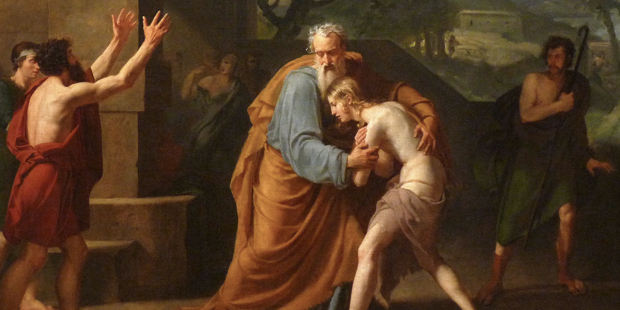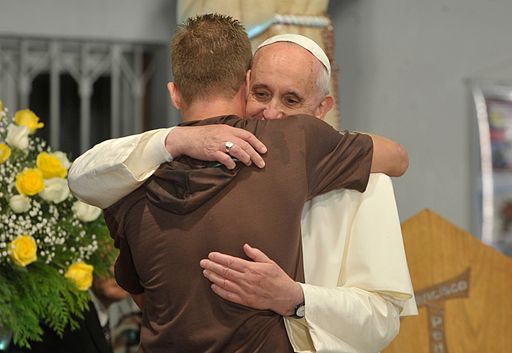CYCLE C . LENT . WEEK 4
REFLECTION
– By Fr Ugo Ikwuka
Archway, London
At a children’s Mass, I asked the children who was the most stressed in the parable of the Prodigal Son and one of them screamed, “The fattened calf!” The parable which forms our Sunday Gospel is perhaps the greatest story ever told.
The fall of the wayward son began, not when he started living recklessly far from home but the moment he claimed his rights; separating his interests from that of his family. The desire to move on and face the responsibilities of adulthood is natural but moving on as freeing oneself from authority is the bane of youths. The father allows his younger son to leave; sometimes the worst thing that can happen to us is God allowing us to get what we want to teach us that our selfish desires can’t satisfy.
We should, therefore, beware of what we ask for because we might just get it. The prodigal son got what he wanted, but lost what he had. He got ‘freedom’ but ended up a slave; working for a stranger, the very thing he could not do for his own father. Worst still, he feeds pigs; the most demeaning job for a Jew. Sin promises freedom but it only enslaves, it promises success but it only brings failure, it promises life but the wages of sin is death (Romans 6:23).
To his credit, however, as he hit rock bottom, he came to a crushing sense of his foolishness. This contrition is not a moment of depression as many feel it, but that of liberation. An alcoholic usually needs to end up in the gutter before taking the decisive step towards sobriety. That life-changing step is captured in what Jesus says about the lost son, “He got up…” While this sounds simple, it takes courage to get up to face the possibility of rejection and scorn. He did not repent and remained drowned in guilt. He turned the resolution into action and embarked on the long and difficult journey home.
In his waywardness, when he compared himself with his rough drug using friends and the harlots, he scored himself favourably. But when his thoughts turned to home and he compared himself to the father he abandoned, he admitted he was worthless. In the same way, when we relate with people of various degrees of depravity, we assume that we are relatively ok and soothe ourselves. But when our standard is Jesus Christ, we see our hopeless true condition.
A mark of true repentance is the Prodigal Son’s desire to be subject again to authority. He became lost when he claimed his rights to be free; he is found when he surrenders them. In the same way, modern man will continue to drift away in his desire to be free of all norms. He can only be found when he surrenders himself to the rule of life as graciously provided in the Gospel!
The appalling behaviour of the wayward son is not in doubt and his humiliating sufferings served him right. But that’s not the reaction of the father who still stands watching and waiting at the spot where the son left him. He didn’t run after him into the wild neither did he go back to his comfort. When he spotted him still a long way off, moved with pity, he breaks protocol and runs out to embrace him. Yes, the young should run to the old and the guilty to the offended but here, the old man throws caution to the wind and reverses the roles.

He didn’t even need his well-prepared apology. He ordered a party and asked that he be clothed in royal purple and matching sandals with a ring in his finger. When we were baptised, we entered into a kind of marriage relationship with the Lord. Christ is the bridegroom, the church is the bride. When we sin, we lose the wedding ring. But the Father restores it, re-establishing the relationship. That’s what happens at confession.
The attitude of the father demonstrates the ways of God which could be difficult for us and the sulking older son to understand. He has been the good boy but it is the naughty one who is being rewarded with a lavish party. We learn here that we are judged, not by our past but by our present; our relationship with God and others here and now. That was why the thief who was crucified with Jesus made heaven; right there on the cross, he showed a change of heart.
Moreover, the parable teaches us that while human sin can take the form of wild and rebellious behaviour (the younger son), it could perhaps come more subtly in the form of sulking, angry and judgmental attitudes (the older son). Those of us who lead quiet and seemingly “responsible” lives may very well fall into the trap of sullen, resentful and angry attitudes toward others who seem to be “getting away with murder.” What we need to ask ourselves is whether we have the kind of love that can understand why others, often less privileged than ourselves, may need both correction and forgiveness.




